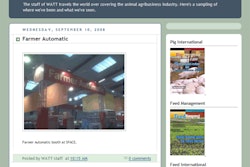The need to go green has grown from a nagging tug to a tightened grip on corporations around the world, including those in the feed business. But with consumer demand and market necessity pointing ever increasingly toward the need for greater sustainability, are businesses truly prepared to find ways to make profits while improving the environment or are efforts to be eco-friendly going to stay widely superficial?
Change spawned by biofuels
While animal agriculture has certainly received its share of criticism, some of it rightly so, for its impact on the environment over the decades, the growth of the biofuel industry has had astounding impact on the price of feed grains to the point that the feed industry itself cannot afford to ignore the call to shape a greener future based on the significance of that issue alone.
Many leaders in the feed industry are no longer content to express opinions over the correlation between corn used to satisfy a hungry ethanol industry and the escalating feed price. Instead, they are becoming active players in providing solutions, with many of them stepping outside their normal comfort zones and typical markets in an effort to take a proactive, rather than reactive, approach to biofuel impact on commodity grains.
The stakes are high. The feed industry has much to lose if the path to sustainability isn't profitable or genuine. On the other hand, our industry is particularly well-poised for its quest for marrying an improved environment with the task of feeding a growing global population.
This ability to focus on innovative and genuine solutions has not always been the case in all of agriculture. Take the example of organic food production where emotions soar and accusations fly over what is pure and what is contrived. Such uneasy circumstances have been heightened as more large grocery conglomerates tested the water of organic markets. Can organic really be mainstream as well? Many proponents believed the answer to be no, even while the larger retailers began to roll out their marketing plans.
But interest and intentions alone are not going to win these giant grocery retailers a seat at the organic table. Blurring the lines between labels such as natural' and what is truly certified as organic in countries where standards exist merely exasperates the situation and again raises the question of whether the food and feed industry can truly go green or just wave at the idea. The pinch is not only on the retail side. Some large commodity producers, eager to cash in on the growing organic market but short on the willingness to follow somewhat time-consuming and costly procedures to be properly certified organic, have found themselves shut out of the market altogether, their certification yanked and their marketing niche dissolved.
In its need to go green, can the feed industry learn from such situations?
Green as value-added
While some may believe enforcement of any green-related standards — whether organic or animal welfare or conservation of soil resources — smacks of bandwagon activism and the work of special interest groups only, such an attitude loses sight of the important role such standards can play in assuring that becoming environmentally friendly while remaining profitable can also provide a sharing of values as well between corporation and customer. These values, if properly adopted by the feed industry, and shared with others along the food chain to the ultimate consumer, are what can set apart a true green revolution, led by the feed industry and agriculture, apart from the businesses out there riding the green parade via short-sighted public relations tactics.
As some in our feed industry are beginning to demonstrate, becoming the greenest generation is more than just a few well-timed marketing maneuvers. It takes long-term investment and strategy. But in doing so, they can establish their value in the minds of their customers in the existing marketplace and sometimes in new and expanded markets.
Suddenly making a profit while improving sustainability has value-added potential. It is no longer sufficient to market a product, it has become necessary to market a company's virtue by allowing customers to express their values in determining what the environmental impacts should be.





.jpg?auto=format%2Ccompress&fit=crop&h=167&q=70&w=250)











